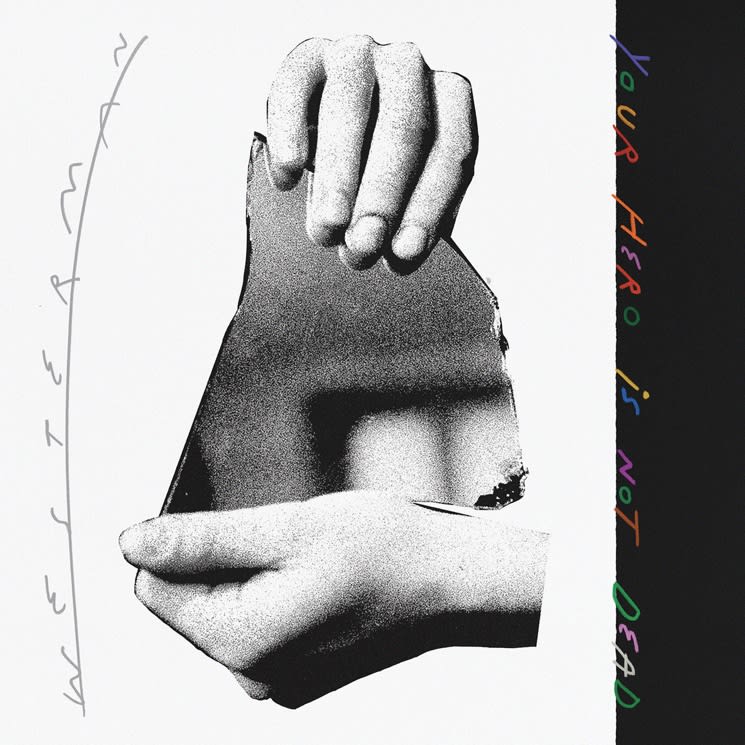London singer-songwriter Will Westerman (who performs under his last name) opens and closes his debut album with its title, assuring the listener that "your hero is not dead," while being ambigious about what that actually means and why it might be important. Westerman's music carries traces of Neil Young, Nick Drake and Tear for Fears in its DNA, yet his featherlight folk-pop resides entirely within his unique point of view.
Many of the songs on Your Hero Is Not Dead have been previously released as singles, some as far back as 2018, and Westerman seamlessly weaves them together with new material to create a cohesive and graceful full-length album. Westerman's music is so delicate and slight that it seems these songs may blow away on an afternoon breeze or scatter like particles of light, yet these songs are surprisingly catchy, due in part to Bullion's bouncy and swirling electronic production and Westerman's keen understanding of melody.
A playfulness emerges from Bullion's electronic flourishes, especially combined with Westerman's subtle wit. Toward the end of the woodblock-driven "Easy Money," a deadpan ode to material wealth, Westerman plainly states "Now I can have my fill / So I...will," a simple statement that urges the listener not to take him too seriously. Subtlety and understatedness are the guiding principles of this album, but that does not preclude Westerman from traversing a range of emotions, thoughts and topics.
The slow-moving "Blue Comanche," is a meditation on climate change and anxiety over the future of human life on Earth. He speaks of cyborgs, trees, acorns, blue corn at sunset, and urges the titular "Comanche" to "turn back around," as though reversing time is the only way to save the world from crumbling entirely, a sentiment echoed in the title track ("You want to turn the Earth backwards"). The upbeat and poppy "Think I'll Stay" is eerily resonant: "I control the controllable / Don't take comfort in cheating death / But I will / Look forward to meeting you, my friend." Upon close examination, these lyrics offer a thoughtful account of the ups and downs of living with chronic pain.
At times Westerman's lyrics seem inscrutable, obscured beneath gossamer poetry ("...memories in waves of stamps and in your blood"), but each line is delivered with heartfelt sincerity that rewards in-depth consideration. The album's standout is "Confirmation," a shimmering contemplation on creative work. The lyrics are disarmingly self-deprecating ("Good job, pinhead / So happy you were born") and wise ("Don't you wonder why confirmation's easier / When you don't think so much about it"), and this has earned Westerman apt comparisons to avant-pop musician Arthur Russell.
Your Hero Is Not Dead is an impressively contemplative debut album, filled with quiet music that packs a surprising emotional punch. Westerman is attuned to the way subtle flourishes — woodblock percussion, a quiet synth line, ethereal layered vocals — can elevate and add layers to a song. His unique brand of soft, quiet folk-pop is perfectly represented here, and leaves the listener with a compelling mystery to ruminate on: "Your hero is not dead, just sleeping."
(Partisan)Many of the songs on Your Hero Is Not Dead have been previously released as singles, some as far back as 2018, and Westerman seamlessly weaves them together with new material to create a cohesive and graceful full-length album. Westerman's music is so delicate and slight that it seems these songs may blow away on an afternoon breeze or scatter like particles of light, yet these songs are surprisingly catchy, due in part to Bullion's bouncy and swirling electronic production and Westerman's keen understanding of melody.
A playfulness emerges from Bullion's electronic flourishes, especially combined with Westerman's subtle wit. Toward the end of the woodblock-driven "Easy Money," a deadpan ode to material wealth, Westerman plainly states "Now I can have my fill / So I...will," a simple statement that urges the listener not to take him too seriously. Subtlety and understatedness are the guiding principles of this album, but that does not preclude Westerman from traversing a range of emotions, thoughts and topics.
The slow-moving "Blue Comanche," is a meditation on climate change and anxiety over the future of human life on Earth. He speaks of cyborgs, trees, acorns, blue corn at sunset, and urges the titular "Comanche" to "turn back around," as though reversing time is the only way to save the world from crumbling entirely, a sentiment echoed in the title track ("You want to turn the Earth backwards"). The upbeat and poppy "Think I'll Stay" is eerily resonant: "I control the controllable / Don't take comfort in cheating death / But I will / Look forward to meeting you, my friend." Upon close examination, these lyrics offer a thoughtful account of the ups and downs of living with chronic pain.
At times Westerman's lyrics seem inscrutable, obscured beneath gossamer poetry ("...memories in waves of stamps and in your blood"), but each line is delivered with heartfelt sincerity that rewards in-depth consideration. The album's standout is "Confirmation," a shimmering contemplation on creative work. The lyrics are disarmingly self-deprecating ("Good job, pinhead / So happy you were born") and wise ("Don't you wonder why confirmation's easier / When you don't think so much about it"), and this has earned Westerman apt comparisons to avant-pop musician Arthur Russell.
Your Hero Is Not Dead is an impressively contemplative debut album, filled with quiet music that packs a surprising emotional punch. Westerman is attuned to the way subtle flourishes — woodblock percussion, a quiet synth line, ethereal layered vocals — can elevate and add layers to a song. His unique brand of soft, quiet folk-pop is perfectly represented here, and leaves the listener with a compelling mystery to ruminate on: "Your hero is not dead, just sleeping."
